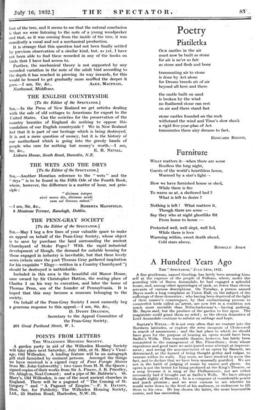A Hundred Years Ago Tax " SPECTATOR," JULY 14TH, 1832.
•
A fine gentleman, named Gooding, has lately been amusing him. self at the expense of the people of Fulham, where, under the sounding title of Baron Annandale, he had engaged a splendid house, and, among other appendages of rank, no fewer than eleven servants of various descriptions. On Tuesday, a person named Bayes made a long complaint at Union Hall, on the subject of the sufferings of these domestics ; who having been deprived of the light of their master's countenance, by that embarrassing process to counterfeit lords called ati'arrest, are now left in a condition not much more enviable than Nebuchadnezzar'a,—having nothing, Mr. Bayes said, but the produce of the garden to live upon. The magistrate could grant them no relief ; so the eleven domestics of Lord Annandale continue to subsist on cabbage and hope.
SADLER'S WELLS.—It is not very often that we venture into the Northern latitudes, or explore the term incognita of Clorkenwoll in search of amusement ; and the last place to which we should have gone for the purpose of hearing an opera would have been Sadler's Wells. This venerable theatre, however, has lately been committed to the management of Mrs. Fitzwilliam ; from whose experience and good taste we anticipated some attempt at improve- ment ; and seeing the announcement of an opera by Barnett, wo determined, at the hazard of being thought gothic and vulgar, to venture within its walls. Nay more, we have resolved to avow the fact, and to declare that we have been unusually gratified. We are not in the habit of judging of music by names and places. An opera is not the better for being produced at the King's Theatre, or a song because it is sung at the Philharmonic, nor are either necessarily bad if brought out at Sadler's Wells. We have always thought highly of Barnett ; he is a composer of considerable power and much promise ; and we were curious to see whether he would write down to the level of his audience, or endeavour to lift them to his own. He has chosen the latter, the more honourable course, and has succeeded-


































 Previous page
Previous page